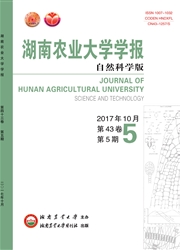

 中文摘要:
中文摘要:
对自选魔芋内生拮抗细菌M3、1-7、M2的生防机理进行研究,结果表明,魔芋内生菌M3、1-7、M2具有广谱抗性,3株菌及其代谢粗提物对不同致病力的魔芋软腐病菌均有拮抗作用;3株拮抗菌分别含有不同的抗菌素基因,1—7与魔芋软腐病菌MY9的相似营养系数最高,达90.63%;M3在魔芋根际及体内定殖能力均为最强,可达8.2×10^7CFU/g;接种时间、接种量及接种方式对生防效果影响较大,生防效果与拮抗菌接种量呈正相关,接种病原菌前1d接种拮抗菌生防效果最优,球包衣的防治效果优于灌根,M3包衣防效可达79.15%;施入拮抗菌后,魔芋体内和根际土壤微生物群落对底物代谢碳源利用的丰富度和代谢活性明显提高。
 英文摘要:
英文摘要:
The mechanism of biocontrol of plant pathogens by antagonistic bacteria (M3, 1-7 and M2) endogenous in Amorphophallus konjac(A, konjac) was investigated. The results showed that the three strains inhibited a wide range of plant pathogens. The strains and their crude metabolites showed antagonistic effects to Pectobacterium carotovora sub sp.carotovora (Pcc) with different virulence. Three antagonistic bacteria contain different antibiotic genes and have high similarity in nutritional factors with Pcc. Three strains have a long-term colonization in the rhizosphere and in vivo A. konjac with a large number, among which M3 showed the strongest colonizing ability. Inoculation time, inoculum size and method showed a great influence on biocontrol effect which was positively correlated with inoculum size. Inoculation of the antagonistic bacteria 1 day before pathogen inoculation showed the best biocontrol effect. The control efficacy of coating was better than the effect of root watering and the control efficacy of M3 inoculated through coating reached 79.15%. After applying the antagonistic bacteria, utilization of substrate metabolism carbon source and metabolic activity of microbial communities in A. konjac and its rhizospbere soil improved significantly.
 同期刊论文项目
同期刊论文项目
 同项目期刊论文
同项目期刊论文
 期刊信息
期刊信息
